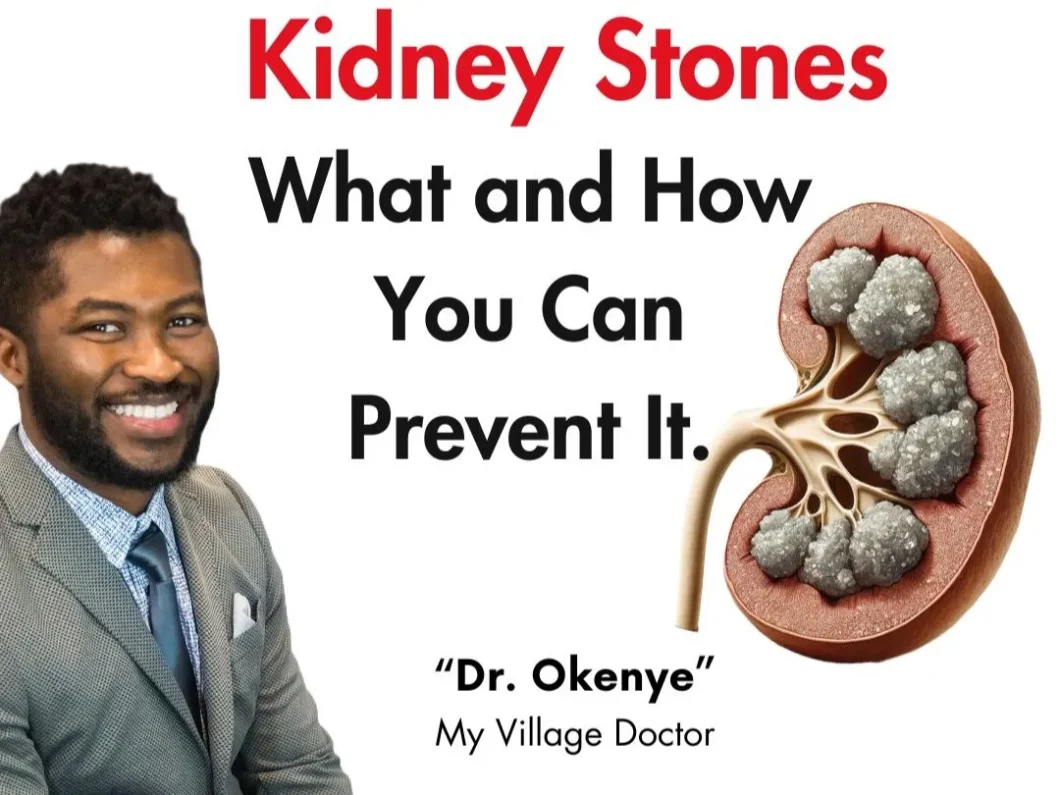My village people, I have come again, it’s Dr. Okenye, your village doctor. I have received so many questions about kidney stones. Kidney stones are small, hard deposits typically made of minerals and salts that come together and crystallize in concentrated urine. I want you to know the most common types of kidney stones:
- Calcium oxalate stones
- Uric acid stones
Calcium oxalate stones are formed when calcium and oxalate bind to one another in the kidneys and form crystals that can be obstructive. The problem is not the calcium in the foods you are ingesting, and in fact, trying to decrease your intake of calcium-rich foods will make the problem worse. The biggest concern I find is patients eating foods that are very high in oxalate content, including nuts, seeds, legumes, fruits, and many vegetables like spinach.
Next are uric acid stones, which are formed from certain compounds called purines that eventually break down to form uric acid, which acidifies the urine and makes it easier to form uric acid stones. So, eating foods rich in purines like red meat and shellfish, and drinking alcoholic beverages can increase your risk.
Next, I want to tell you some of the complications of kidney stones.
5 Dangerous Complications of Kidney Stones
In the first part, we defined kidney stones and how they form. In this part, I discuss about 5 dangerous complications of kidney stones.
- Urinary Obstruction: When the stones are formed and occupy the entire tube, it can completely occlude the tube, making it difficult for urine to pass, subsequently increasing the risk of the entire urine backing up and possibly flooding the kidneys.
- Renal Rupture: In the event that the kidney walls are thin, and you have this great flood of urine now backed up in the tube, it can cause the different chambers to get inflamed and rupture. This is rare, however.
- Kidney Failure: Because the kidney is flooded, it can destroy the renal filtering system and lead to total kidney failure, creating the need for dialysis or a kidney transplant.
- UTI: Bacteria love to thrive on the stone residue if not completely eliminated.
- Pyelonephritis: This is basically when the urinary tract infection reaches back into the kidneys and infects the kidneys, setting up a very dangerous risk of bacteria getting into the blood and severe sepsis.
Don’t play around with kidney stones; get this checked out by your doctor.
6 Dietary Recommendations for Kidney Stones
Hello, my village people, it’s Dr. Okenye, your village doctor. I have come again. In the first part, we defined kidney stones and how they form. In second part, I discuss about 5 dangerous complications of kidney stones. In this Final part I want to talk to you about 6 dietary recommendations for kidney stones.
- Eat enough dietary calcium: Yes, you heard me right. Although calcium oxalate stones are common, and it might sound intuitive to decrease your dietary calcium intake, it is actually the opposite; you need more calcium in your diet. At least three to four servings of dairy-rich foods every day will definitely help lower the risk of calcium stone formation. But remember to avoid extra calcium supplements.
- Limit foods with high oxalate content: These would include foods like nuts, beets, berries, spinach, especially spinach. Another one is chocolate, yes, I am sorry.
- Eat a moderate amount of protein: Not a high amount, but a moderate amount, because high protein intake will make you excrete more calcium, which may cause more calcium oxalate stones to form in the kidneys.
- Avoid high doses of vitamin C supplements: I recommend my patients take around 60-100mg/day of vitamin C supplement, but excess amounts of >1000mg/day may worsen your risk of stones.
- Decrease your sodium intake: This is because sodium and calcium pretty much utilize the same transport channel in the kidneys.
- The most common sodium sources I tell my patients to avoid are canned foods, fast foods, and TV dinners.
Disclaimer: The information provided is for educational purposes only and is not a substitute for professional medical advice. Always consult your doctor before starting any new medication or treatment. This publication and aurthors does not endorse or recommend any specific medication and is not liable for any adverse effects from the use of this information. You can learn more about Dr. Okenye.


